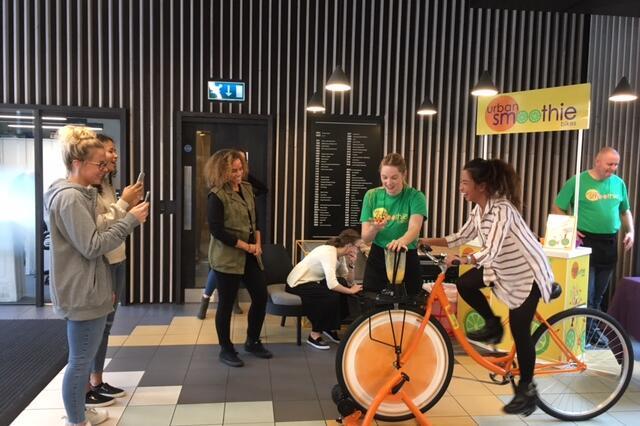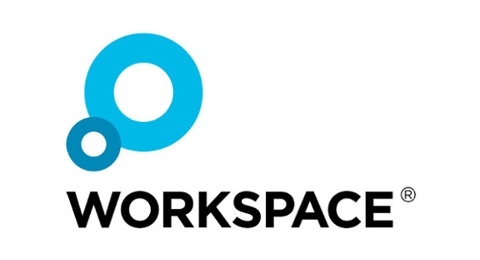Workspace Occupiers Welcome Recycling Opportunities
14 September 2018Workspace Occupiers Welcome Recycling Opportunities
14 September 2018By engaging with occupiers, Workspace has significantly improved recycling rates across its network of business centres. Alongside improvements to facilities, recycling roadshows have proven to be a great way of getting people’s attention. Workspace’s business centres have typically seen a 10% increase in recycling after roadshows.
Key Facts
- ZERO WASTE DIRECT TO LANDFILL
- 66% OF ALL WASTE RECYCLED IN 2017/18
- 135 OCCUPIER RECYCLING SURVEY RESPONSES
- 12 RECYCLING ROADSHOWS ANNUALLY
Situation
Workspace owns and manages a network of 66 business centres in London, home to 4,000 companies. Workspace aims to reduce the environmental impact of both its own activities and those of its occupiers, through its ‘Doing the Right Thing’ strategy.
Workspace’s long-running occupier engagement programme on recycling is a team effort driven by Support Services engaging employees, from Facilities Management to cleaning operatives. The team recognised the opportunity for increased recycling to both keep service charge costs down for occupiers and reduce environmental impacts.
Actions
Workspace engaged with waste contractor Bywaters to identify opportunities to increase recycling. Firstly, Bywaters carried out a waste audit at multiple sites, looking at waste streams and quantities. Facilities teams provided input on issues and opportunities at a site level.
As a result, waste streams were simplified to:
- Dry mixed recycling.
- General waste.
- Food waste in 80% of cafés.
Workspace's Support Services team developed:
- Materials and tools to support facilities teams and occupiers, including signage and guides.
- Multi-lingual booklets for cleaning staff.
Workspace and Bywaters engaged with facilities teams through meetings, emails and monthly updates, and provided them with:
- Clear and consistent signage for use in offices, kitchens, cafés, common parts and back-of-house areas.
- Free flatpack cardboard recycling bins for dry mixed recycling for occupiers.
- Recyclopedia recycling guide to share with occupiers.
- Recycling Roadshow ‘Recipe Card’ (See below), with ‘ingredients’ and ‘method’ on how to run the event, including a simple step by step guide and support.
- Monthly waste data reports, providing portfolio-wide and site by site performance.
In all centres, facilities teams:
- Worked with Bywaters to improve back-of-house recycling areas.
- Removed any pre-existing signage and replaced it with the new signage.
- Provided occupiers with Recyclopedia guides and flatpack cardboard recycling bins.
- Asked occupiers to provide information to their cleaning partners to avoid recyclables going in general waste.
- Encouraged occupiers to reduce waste bins in their spaces to one central waste bin. Research shows that preventing employees from having individual waste bins reduces general waste.
On an ongoing basis, facilities teams and Centre Managers continue to:
- Carry out daily checks of waste areas and regularly review (at least quarterly) whether bins are being used to full capacity and whether the collection frequency is adequate.
- Monitor waste data each month, sharing this with occupiers.
- Engage with occupiers on recycling through newsletters, keeping them informed of performance and what they can do, as well as encouraging them to use data in their own sustainability communications.
12 centres held recycling roadshows in reception areas in 2017/18, giving occupiers the chance to:
- Talk with centre teams and Bywaters about recycling.
- ‘Visit’ the Bywaters recycling centre through the use of virtual reality headsets.
- Play the waste sorting game, competing to see who could put waste into the correct bins most quickly.
- Use cycle power to blend their own smoothie.
Looking forward
Initiatives to gain insights for future activities included:
- Recycling surveys completed by 135 occupiers.
- Sustainability surveys completed by 15 cafés.
- 14 waste audits conducted.
Targets for 2019 include:
- Increase recycling to 70% and maintain 100% diversion from landfill.
- Engage with Bywaters to measure 100% of waste by weight, rather than volume or estimated.
- Engage with café and catering partners on sustainability.
- Engage with occupiers on sustainability through events, workshops, newsletters, posters and social media.
Building on the success of the occupier engagement on recycling, Workspace is also exploring additional opportunities. In 2018, all Facilities Managers and Centre Managers took part in head office training sessions, where they discussed ideas for events, competitions and initiatives to encourage people to cycle to work, save energy and reduce, re-use and recycle waste. Workspace has developed posters around these messages and, informed by feedback from the training sessions, is developing a resource library of ‘Recipe Cards’ to make it easier for centre staff to organise events.
Financials
- £2,680 investment in recycling posters and waste stream branding, along with investment in new bins and signage, funded as part of waste services.
- £28,000 estimated annual savings for occupiers, with 7% lower costs for dry mixed recycling than general waste.
- Tiered financial incentives for Bywaters for monthly recycling performance, with penalties below 60% recycling.
- £600 average costs per roadshow, funded through each centre’s events budget.
Benefits
2017/18 results:
- Zero waste direct to landfill.
- 66% recycling, up from 61% the year before.
- 2,066 tonnes recycled.
- Contributing to Workspace’s Doing the Right Thing strategy and aim to reduce the environmental impacts of its properties and their related supply chains.
- Engaging with occupiers and supporting their sustainability goals.
Challenges and Achievements
REPORTING
How to improve waste data accuracy?
Waste data is a challenge across the UK, often based on volumes or estimates rather than accurate weights. Workspace is working closely with Bywaters to improve data quality, checking how much has been accurately weighed during monthly meetings. Workspace set a target for Bywaters to measure 75% of waste by weight (rather than volume / estimated) by September 2017, which Bywaters achieved. They are now working towards 100% by July 2019. Bywaters is investing in a new fleet of vehicles with enhanced weighing equipment. Bywaters has also introduced a new online portal where Workspace, Facilities Managers and Centre Managers can easily review performance data for individual sites and groups of sites. This follows the principles set out in the Managing Agents Partnership Reporting Framework. The Bywaters portal is very visual, making it easier for Bywaters and Workspace to engage with site staff.
LOGISTICS
How to partner with waste contractors on recycling?
Workspace has incorporated performance indicators into the contract with Bywaters, with tiered incentive payments if they surpass recycling targets and penalties below 60% recycling. Monthly review meetings were key to driving progress in the first year. For instance, one business centre has a narrow access route and, if any cars are parked along it when the recycling van visits, the recycling cannot be collected. Initially this resulted in recycling being collected on an emergency basis, which meant it went in with general waste. However, after this was highlighted in monthly meetings, Bywaters’ collection teams made a concerted effort to collect recycling, including waiting beyond the standard time where possible. Bywaters is also reviewing which sites would be most suitable for waste compactors to reduce waste collection frequency.
CAFÉS
How to create a better food future?
Around 20 of Workspace’s business centres have a café on site. 80% now recycle food waste in kitchens and occupier areas, with food waste going for anaerobic digestion. In 2018/19, Bywater will set up food waste collections for remaining suitable sites, identified in waste audits. Events with North London Waste Authority to encourage food waste recycling have also been held at three centres. In February 2018, Workspace sent all café managers a sustainability survey to gain insights into additional opportunities. 75% responded:
- All offer people the option to use a china cup rather than a disposable one.
- Around a third offer a discount for occupiers who bring their own coffee cup.
- Almost all replied ‘yes’ to the question ‘Do you consider the environmental impact associated with the type of packaging you use?’
- Most procure food locally and coffee that is roasted locally.
In 2018/19, Workspace will engage with café and catering partners on sustainability matters. This will build on the success of Workspace’s engagement on sustainability with Vacherin, the catering company that operates most of the cafés. Sustainability was factored into the tendering process. Vacherin has already introduced a plastic straw ban, serves wonky vegetables to reduce waste, runs red meat free Mondays and sources 90% of meat and dairy products from the UK.
Find out more
Karen Jamison
Energy & Sustainability Manager
Workspace
E: Karen.Jamison@workspace.co.uk
T: 020 7369 2258
*Please note that the information on this page was supplied by the BBP Member and the BBP assumes no responsibility or liability for any errors or omissions in the content

